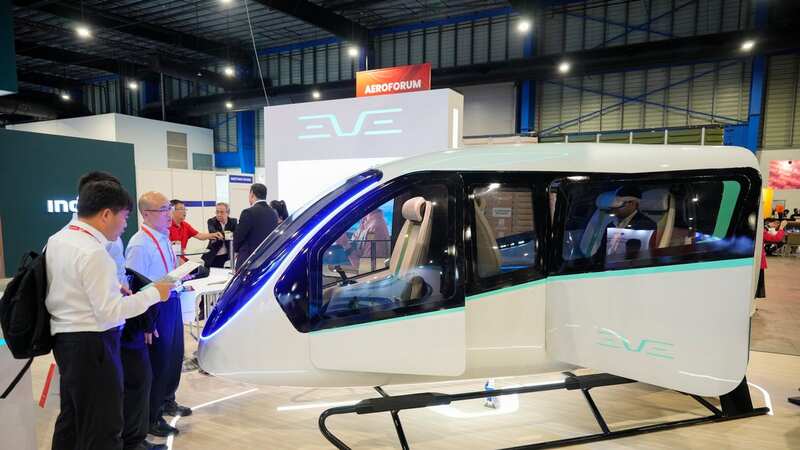Hyundai's Supernal and Embraer-backed Eve Air Mobility bet on air taxis

Hyundai's Supernal and Embraer-supported Eve Air Mobility are betting on electric air taxis as the future of travel.
They're developing electric aircraft that can take off and land vertically, which could be a sustainable way to get around in busy cities or places with less public transport. Experts think these air taxis could help reduce carbon emissions from traditional planes, but there are still lots of technical and legal issues to sort out before they can be used commercially.
However, with battery prices dropping, technology getting better, and big companies like Hyundai getting involved, experts believe these electric air taxis could be flying around in the next two to four years. "Ground transportation is evolving and improving, but to support all the mobility demands of ... people in urban areas, ground transport will not be sufficient," said Supernal's CEO Shin Jaiwon. "We have to open the skies above the cities."
Supernal's S-A2 electric aircraft, which can carry a pilot and four passengers, is set to be tested in California this year. It's like a helicopter but quieter and better for the planet because it doesn't produce carbon emissions from flying. The company is also talking to aviation safety agencies in the US and Europe about rules and certification.
Earlier this week, Supernal teamed up with Singapore's aviation authorities and economic development officials to work together on research and regulations for advanced air mobility. Meanwhile, Brazilian firm Eve Air Mobility, which is part of the third-largest aircraft manufacturer Embrarer, is also working on an electric aircraft that can take off and land vertically (eVTOL). They hope to launch it by 2026.
 'UK's most neglected street with post-apocalyptic scenes like The Last of Us'
'UK's most neglected street with post-apocalyptic scenes like The Last of Us'
Just like Supernal's S-A2, the Eve Air Mobility's aircraft is expected to carry between four to six passengers and travel up to 60 miles without producing any local carbon emissions. Johann Bordais, who is the boss of Eve Air Mobility, thinks that electric flying taxis could be a cool new way for people to get around in cities or places where buses and trains aren't great. But they won't take the place of normal planes.
"We're going to be putting more people in the air, we're giving an alternative - just like electric vehicles are on the ground in 2D, we want to make sure that we can make the same thing that happens but in 3D," he said.
Air taxis are just one of many ways that the aviation sector is considering to improve sustainability. Airlines are moving toward using a blend of sustainable aviation fuel made from renewable sources, with the industry aiming for net zero emissions by 2050. Aviation firms are also designing more fuel-efficient aircraft and engines.
Right now, flying taxis and other new ways of flying still have some big challenges, like how much the batteries cost, making new rules to keep everyone safe, and getting the okay for these flying machines. Brendan Sobie, an aviation expert, thinks air taxis could really work now with the right rules. "There's the feasibility of operating in various environments, various air spaces, various cities and urban environments," Brendan Sobie explained.
Supernal's Shin knows that batteries for flying cars are still pricey. "However, as battery technologies continue to improve and further develop over time, we believe that manufacturing will also be improved and developed, so the overall cost of making such vehicles will be going down," he mentioned. Shin said Supernal can use Hyundai's big experience and ability to make lots of things to make sure their flying taxis are top-notch and not too expensive.
Eve Air Mobility's Bordais is positive too because his company has Embraer's long history of making and getting approval for planes. "We know what we're doing, we've done it," he stated. "We don't want to be the first one. We want to be the right one. We're here for the long run. You'll see these (aircraft) flying around in 2026."
Read more similar news:
Comments:
comments powered by Disqus

































